Previously we looked at the first part of the March 16th ‘Hardtalk’ interview with Palestinian politician and long standing BBC contributor Mustafa Barghouti [televised BBC News channel version here, BBC World Service radio version here]:
BBC’S HARDTALK PLATFORMS A ONE STATER’S DISTORTIONS AND SMEARS – PART ONE
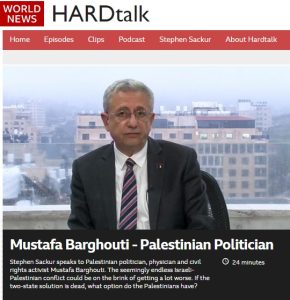
As noted, Barghouti had employed the ‘apartheid’ smear five times up to that point, along with equally disingenuous allegations of “enslavement” and “ethnic cleansing”, without challenge from the presenter Stephen Sackur. When Sackur finally did react to his interviewee’s repeated use of the word apartheid, it was not to explain to audiences why it is inaccurate and inappropriate but to use it as a cue to promote his own talking points. [emphasis in italics in the original, emphasis in bold added]
Sackur: “You’ve made the point about Mr Smotrich several times and your view of the Israeli government today, and you’ve used the word apartheid, which other Palestinians use, but indeed some Israeli critics of the current government also use to describe what they fear may become the reality if this government continues with its current policies. Apartheid’s an interesting word because it also raises memories and comparisons with, for example, the liberation struggle in South Africa and the role of the ANC. I would put it to you that a fundamental difference between what we saw in the liberation struggle in South Africa and what we see amongst Palestinians today in your communities, we do not see unity. We do not see a coherent leadership in the Palestinian communities. We also do not see the same level of support from the international community. Let’s start with the internal division. How can you present yourselves to the world as a national resistance when you are so deeply divided?”
Barghouti: “I totally agree with you. Our internal division is one of our biggest weaknesses. And that’s why the strategy I was telling you about…I started with popular resistance, but then I should have continued. The second very important factor is to have a unified national Palestinian leadership. And to get to unity, the path is very clear. It’s through democratic elections. It’s through allowing the people to choose their leaders democratically. But in addition to that, we need the world. We need a campaign of Boycott, Divestment, Sanctions against the system of apartheid and occupation like it was used before in the case of South Africa. We need also to help people steadfast against this terrible system of oppression. You know that 62% of the West Bank today is deprived from the right of even building a clinic or a kindergarten or a school. You know that the West Bank now is divided by Israel in 224 ghettos – or I call them, actually, ghettostans – separated from each other by 644 military checkpoints, a wall that is…that took away 18% of the West Bank. And on top of that, we have the settlers and the settlements. We spoke about the Israeli army, but we should also speak about the fact that settlers are the ones who are most aggressive today. Those are the ones, the mobs, that attacked Huwara, which Smotrich also spoke about erasing and…completely from existence.”
Once again Sackur failed to clarify that the “62% of the West Bank” is in fact Area C which is under Israeli administration pending final status negotiations or to question Barghouti’s use of the inflammatory term “ghettos”. Audiences were not informed that Barghouti’s exaggerated portrayal of checkpoints and “a wall” that is mostly a fence refer to measures employed to prevent Palestinian terrorism against Israelis.
Sackur: “Yes, let’s…”
Barghouti: “These settlers have… excuse me, just one moment. These settlers have become one of the most important political forces in Israel. Smotrich himself is a settler. Ben-Gvir, who was accused of being a terrorist, or at least he was… He belonged to a system, to a party, Kach – Kahana movement – that was classified as terrorist even in Israel. These people are settlers and they have 15 members in the Israeli Knesset, and they are the ones who are running the show.”
Sackur: “If I may say so, Mr Barghouti, you’re very keen always to bring the focus back onto what the Israeli government is saying and doing. I really want you to focus on what’s happening within the Palestinian community. You talk about the need for unity. There is no unity whatsoever. We have a Palestinian Authority which agreed to meet the Israelis at the end of February at the so-called Aqaba Summit, overseen by the Jordanians, Americans, Egyptians. But at the same time, we… at the same time, we have Hamas, which remains committed to resistance, to refusing to recognise the right of the Jewish state to exist, and which, according to many of its historical documents, wants to establish a Palestinian state from the Mediterranean to the Jordan. How are you going to bring these Palestinian agencies – the PA on one side, Hamas on the other – together?”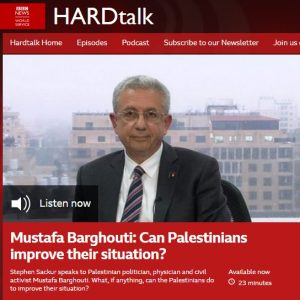
Contrary to the impression given by Sackur’s curious reference to “historical documents”, Hamas repeatedly voices its “from the river to the sea” intentions – including on the day that one of these programmes was aired by the BBC.
Barghouti: “It would be very easy if we are allowed at least to have some control over our lives. In reality, the ones who are talking about a state from the river to the sea, they are…is the Israeli government, which declares in its declared official statement that there is no place for Palestinian state.”
Sackur: “Come on, Mr Barghouti, we know that on both sides of this conflict today there are many people, many Palestinians as well as Israelis who now say, ‘We want it all. The time for talk of a two-state solution is over, there will have to be one entity through that whole territory’.”
Barghouti: “Stephen, let me answer a couple of questions you asked, please. First of all, it Israel that bombarded or undermined the whole Aqaba meeting. I think the Aqaba meeting was used as a cover for what Israel is doing. The Aqaba meeting did not speak about freezing settlement activities. It spoke about freezing only planning for settlements. And, actually, Israel has just approved 13 new settlements and they continue to build them. They approved 10,000 new units. Now, even the planning will not be frozen. That’s what Smotrich said. He said, “I am the governor of the West Bank. “I will not allow this to happen.” Netanyahu said, “Settlement will continue as it was planned,” and Ben-Gvir said, “What happened in Aqaba stays in Aqaba.” So the Israeli side, even the little things that was done in Aqaba, was rejected officially by the Israeli government. Let’s be frank here. Nobody should continue to blame the victim in this conflict. The whole world has not been good with us. There has been constant double standards, blaming the Palestinians all the time, regardless of the fact that we have been subjected to occupation, to a system of apartheid and now a terrible amount of violence that is practised not only by the Israeli government and the Israeli army, but also by Israeli settlers who are very, very dangerous. And they could really bring this whole place into a big explosion. if they attack Al-Aqsa Mosque as Ben-Gvir is promising or if they continue to pressure Palestinian prisoners, where prisoners are now subjected to an increased amount of oppression.”
Barghouti’s claim of “oppression” – actually the closing down of bakeries in prisons and limits on shower times – and his unevidenced claim of a ‘promised attack’ on Al Aqsa Mosque were not questioned by Sackur.
Sackur: “You earlier in this conversation said that ‘our national resistance as Palestinians must be matched by the outside world, putting new levels of pressure on Israel’. Look at the reality. The United States, led by Joe Biden, clearly is not interested in playing a very proactive role and pressuring the Israeli government. And if you look at the Arab world, you see the peace deals and the diplomatic recognition that has been offered to Israel from the Gulf, from countries like Morocco and Sudan. That’s the new reality. Rather than isolation of Israel, Israel has made unbelievable inroads which leave you Palestinians looking increasingly friendless.”
Barghouti: “Actually, now things are changing in the opposite direction. The plan of Mr Netanyahu was very clear. He said, ‘I will put aside the Palestinian issue. I’ll make peace with the Arab countries, normalise relations with them, and then I might come back to Palestinians to enforce of them a solution’. Not solution, actually, but enslavement. In reality, his plan failed. He made some normalisations with the Emirates, with Bahrain, with all due respect. But look at what happened with Saudi Arabia. Saudi Arabia has just normalised relations with Iran. Saudi Arabia, in my opinion, changed the whole game. And, in my opinion, this whole process of normalisation is failing, not only because the countries he made peace with are almost irrelevant to the Palestinian issue, but also because they are now unable even to receive Netanyahu because of the escalation in Palestine. The Palestinian people are the factor that will determine whether there will be peace and stability here. Everything I said to you in this talk – no, this is important – it’s not against Jewish or Israeli people. No, no, let me say that – it’s not against Jewish or Israeli people. It’s against apartheid, it’s against occupation. These fascists in the Israeli government are hurting even the Israeli judiciary system now, are hurting what they call democracy, although it is only for Jewish people. They are crumbling from within, from inside. Netanyahu has never been in a bad situation as he is today, trying to run away from the four cases of corruption that he should be tried for.”
Sackur failed to challenge Bargouthi’s deliberate distortion of Israeli democracy before going on to ask his final question:
Sackur: “Mr Barghouti, just to end, I want to have this quick thought with you. Not long ago, before he died, the late Saeb Erekat spoke to me and he was full of despair. And he said, ‘Stephen, frankly, I have failed’. Now, he was one of the great advocates and architects of Oslo. You didn’t believe in the Oslo process, but nonetheless you have always believed in a nonviolent solution to the Israel-Palestine conflict. Are you full of despair today?”
Barghouti: “No. As a matter of fact, I still believe in what I believed in, as you said, and I believe we will overcome this situation. I am actually full of hope. I think the world is beginning to see what Israel is really about. They begin to see what Netanyahu is about. They begin to see the suffering we are having today. And I also can tell you, I am optimistic that one day we will not only achieve our internal unity, we will not only achieve our internal democracy, which I struggle for, I believe we will reach that day when there will be peace, but a just one. A just peace. And I believe we will manage to have a one-state solution with full democratic rights for everybody, where Palestinians will have to be respected as equal human beings.”
Barghouti’s “one state solution” is of course in essence no different from Hamas’ ‘from the river to the sea’ aspirations to eliminate the Jewish state, especially in light of his earlier reference to ‘six and a half million refugees’ who he thinks should be allowed to ‘return’ to a place in which the vast majority have never lived. Sackur however passed up on the opportunity to relieve audiences of the long-standing illusion promoted by the BBC according to which Palestinian leaders seek a two-state solution and thereby provide them with some real understanding of the current wave of violence and instead closed that unhelpful interview there.
Related Articles:
BBC’S HARDTALK PLATFORMS A ONE STATER’S DISTORTIONS AND SMEARS – PART ONE

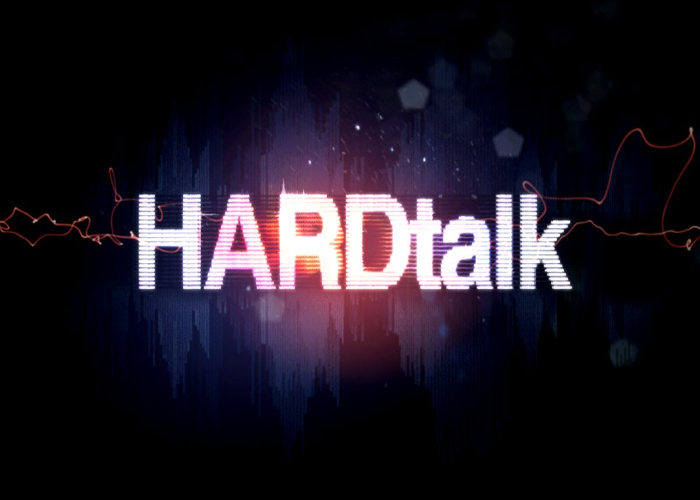
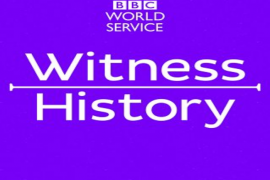
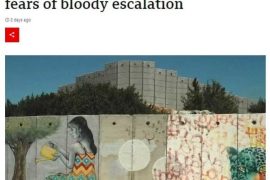
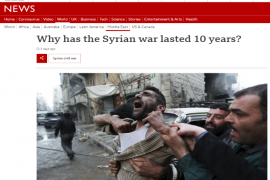

But then for as far as I remember, the Palestinians never wanted peace. I remember
they were offered even half of Jerusalem and 9 tenth of the West Bank plus somewhere another piece of land that would the giving back of all their territories
from before 1967 make complete. They refused. They also wanted that all the refugees of 1948 plus their descendants would be welcomed in Israel proper and
that would mean: bye bye Jewish State.
People should also remember that the Palestinians too were offered a state in 1948 and refused. They should also remember that Jordan was part of Palestine
and that the majority of the population there is… palestinian.
The PA only wants the total elimination of the Jewish State – any other proposal is pure propaganda for naive politicians like the US Democrats and the UK Libdems.